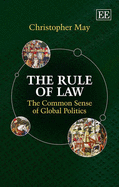 Christopher May’s latest book explores the complexities of the rule of law – a well-used but perhaps less well understood term – to explain why it is so often appealed to in discussions of global politics. Ignas Kalpokas finds that this is a timely and insightful disruption of the monotony of the rule of law discourse for the way it calls into question our supposedly commonsensical assumptions and self-evident practices. It is clearly a significant achievement and undoubtedly recommended.
Christopher May’s latest book explores the complexities of the rule of law – a well-used but perhaps less well understood term – to explain why it is so often appealed to in discussions of global politics. Ignas Kalpokas finds that this is a timely and insightful disruption of the monotony of the rule of law discourse for the way it calls into question our supposedly commonsensical assumptions and self-evident practices. It is clearly a significant achievement and undoubtedly recommended.
 The Rule of Law: The Common Sense of Global Politics. Christopher May. Edward Elgar. 2014.
The Rule of Law: The Common Sense of Global Politics. Christopher May. Edward Elgar. 2014.
The rule of law is a term we often use without even properly thinking about its meaning. It has truly become a commonsensical term, part of the everyday social imaginary, as Christopher May himself argues. It has come to connote all the perceived benefits of the increasing legalisation of our lives: universality, predictability, stability, non-arbitrariness, inclusivity, freedom and so forth. Against this background, Christopher May’s new book is a welcome and timely attempt to problematise the term.
The book itself is structured around several core axes: a survey of the current usage of the term ‘rule of law’ in domestic and international contexts; an exploration of the reasons for the prevalence of the rule of law approach; an analysis of the actual workings (and shortcomings) of the rule of law approach, especially in the contexts of economic aid and post-conflict reconstruction; and, finally, the development of a new, pluralist, account of the rule of law. Therefore, the book is valuable as both a critical-analytical tool and as a source of conceptual innovation. It is also worth mentioning that both ends are achieved in an accessible manner, to be appreciated by non-experts in law or political economy, but without prejudicing the rigour and depth of research and argument.
The first part of the book is dedicated to understanding the current usage of the term ‘rule of law’ and its significance in current legal, political, and economic discourse. Rule of law here is treated as a social imaginary, a concept borrowed from Charles Taylor (which is worth noting because there have been many other renderings of social imaginary). To put it in simpler terms, rule of law has become part of the fabric of our perceptions of everyday world, a necessary element of the interpretive systems used to explain and order the (social) world, shared in a (more or less) intersubjective fashion. That accounts for the commonsensical acceptability of the rule of law as well as for the lack of questioning – rule of law is simply something that self evidently is and it is as it is. And yet, one conceptual (and perhaps ideological as well) disagreement persists: one between ‘thin’ (i.e. minimal, mostly procedural), and ‘thick’ (i.e. having regard for particular social-normative content as well as procedure) concepts of the rule of law. As a result, the author dwells on this distinction for some time, analysing their preconditions and the competing worldviews offered. Although rather expository in nature and at times resembling a compendium more than an analysis, this section is nevertheless a good preparatory ground for the future development of the argument.
In terms of the actual workings of the rule of law, the initial question is the following: how has it become part (and perhaps the dominant one) of the global imaginary? For that, the author traces a genealogy of how a rather narrow, mainly Anglo-American-educated legal elite came to dominate governmental and non-governmental organisations and agencies worldwide, bringing with them their own common-sense norms, among which the rule of law played a significant part. To a significant extent Christopher May’s genealogy of the international community of rule of law adherents parallels Benedict Anderson’s genealogy of the nation in Imagined Communities. And given the presence of such community, it comes as no surprise that the rule of law approach came to dominate economic aid and post-conflict reconstruction programmes, often spearheaded and implemented by lawyers. A result has been an increasingly prevalent one-size-fits-all approach to development and reconstruction, disregarding local specificities as well as local legal and social cultures. Many of the recent failures of development and reconstruction can be explicated through this lens. The same applies to the attempts at integration of the global system(s) of international law, manifested primarily by the so-called global constitutionalism approach. As a result, the author’s take on the rule of law offers a powerful critique of the hegemonic modes of thinking and of increased legalisation of the otherwise political processes.
To be sure, this book is not a critique of the rule of law as such – only of the current dominant use of it. The author moves to address the flaws inherent in the current hegemonic rule of law by opposing to it a pluralist account of what rule of law could and should be: integrating different experiences, needs, and approaches (providing interesting discussions of general legal pluralism and civil disobedience on the way). Of course, that might be a weaker rule of law, concentrating on a more generalised set of similarities only but that is necessary to bring back the subject and his/her action. This is the second major contribution of the book: a well-thought and argued alternative to the dominant mode of thinking. Keeping in mind the tendency in the majority of similar studies to concentrate on either one of the two aspects – either alternative or critique – without due regard for the other, the synthesis of both is a noteworthy achievement of the present volume.
In short, Christopher May’s The Rule of Law is clearly a must for all those interested in legal problems, international political economy, economic development, post-conflict restructuring or, more generally, the role of norms in today’s globalised world. A timely and insightful disruption of the monotony of the rule of law discourse, this book definitely calls into question our supposedly commonsensical assumptions and self-evident practices. It is, therefore, clearly a significant achievement and undoubtedly recommended.
Ignas Kalpokas is a PhD student in Politics at the University of Nottingham, working on a dissertation on Baruch Spinoza, Jacques Lacan, and Carl Schmitt. He holds his Masters degree in Social and Political Critical Theory and Bachelors degree in Politics from Vytautas Magnus University (Lithuania). He has also worked on various educational projects and initiatives. Ignas’ research interests lie in the investigation of interrelated concepts of sovereignty, the state, and the political as well as the formation and maintenance of (national) identities. In addition, his research also involves history, literature, and international relations theory. His preferred theoretical framework is mostly Continental philosophy. Read more reviews by Ignas.





